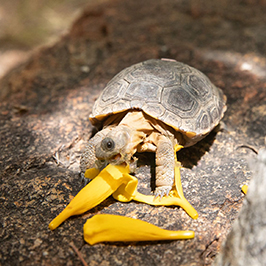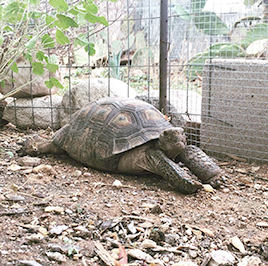Desert Tortoise Adoption Program
Program Overview

The Arizona-Sonora Desert Museum established the Tortoise Adoption Program (TAP) to support the welfare of both captive and wild desert tortoises. The program is sanctioned by the Arizona Game and Fish Department and helps place unwanted or surplus tortoises with qualified private custodians.
TAP focuses exclusively on the Sonoran Desert Tortoise (Gopherus morafkai) within the Tucson area, which lies within the species’ natural range. Other turtles and tortoises that are occasionally accepted by Arizona-Sonora Desert Museum are referred to the Department of Herpetology, as they fall outside TAP’s scope.
Adopted tortoises remain the property of the State of Arizona. Private individuals become custodians, not owners. Only tortoises in apparent good health are placed; animals suffering from illness or malnutrition are held for rehabilitation. Adoptions take place between April 1 and September 30 each year.
In addition to facilitating adoptions, the program emphasizes the preservation of wild populations. It provides guidance on proper care and husbandry of captive tortoises through phone support (520-883-3062), pamphlets, and this website.
Why TAP Exists:
Reducing backyard releases
Many private individuals living within desert tortoise ranges historically kept tortoises as informal pets. Often, these captive tortoises are later released into the wild. Unfortunately, they lack critical survival skills, struggling to find food, avoid predators, and cope with desert conditions, resulting in suffering and early death.
Protecting wild populations from disease
Captive tortoises frequently do not receive proper veterinary screening, making them susceptible to pathogens. When released, they can introduce and spread diseases among wild tortoise populations, with potentially devastating consequences.
Preventing hybridization effects
Arizona is home to two distinct species of desert tortoise: the Sonoran Desert Tortoise (Gopherus morafkai) and the Mojave Desert Tortoise (Gopherus agassizii). Many captive tortoises lack documented locality data, so when privately kept individuals are accidentally released, there's a risk of intermixing these species, undermining natural speciation patterns.

Photo: Sergio Avila
If you are interested in adopting a tortoise, here are the steps to take:
First read all the information on the care of the desert tortoise on this website, including the appendices. Also look at the pictures of the burrow under construction.
Decide if you are comfortable with the requirements for tortoise care and the adjustments you may have to make to your yard. For example, if you have dogs, can they be kept separate?
If you wish to proceed, prepare your yard for the tortoise, and either take advantage of the AZGFD online application process — Tucson area requests will be forwarded to us, or you can follow our process below:
- Review the yard checklist in appendix I (Tortoise Care & Husbandry link). These are the minimum requirements for your yard to pass inspection.
- Build a pen or make sure your yard is secured with no possibility for escape. Check that your fence is underground at least 5 inches and that there is no route to escape around a gate, drainage hole, etc. A self-locking gate is desirable to prevent escape.
- Provide food for the tortoise in the form of grass or native plants. Irrigation will be necessary, especially for the grass. A roll of sod is often adequate to feed a tortoise, so it is not necessary to have a large grassy area.
- Build a burrow following the guidelines on this site. Make sure your burrow is situated so no water can enter the burrow from rainfall, irrigation runoff or drainage. It is best to locate the burrow in a high area of your yard that is shaded in the afternoon. Cover the burrow with a minimum of 8 inches of soil on top, sides and back. The soil is essential to provide adequate insulation for the tortoise.
- Review the yard checklist one more time to make sure you are prepared for a yard inspection. If so, call 520-883-3062 and leave a message on the tortoise hot line requesting a yard check. Leave your full name, address and the best time to contact you.
- An inspection will be scheduled and a determination made at that time what size tortoise will be best for your yard. If you wish to adopt a small tortoise remember to downsize your burrow. Tortoises like cozy burrows. If you wish to adopt hatchings, a cover over the pen may be necessary to protect them from predators.
- If you have any questions while preparing your yard, please call and leave a message and a volunteer will return the call to assist you.